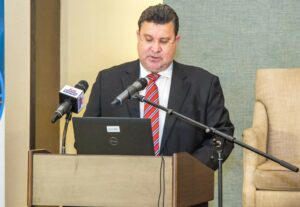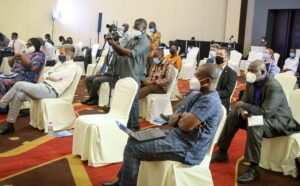New World Bank report says Ghana has opportunity to speed economic transformation and create more better jobs

The general feeling among most Ghanaians today isn’t optimism, but of despondency and disappointment in the current state of affairs. For most Ghanaians, the frequent increase in fuel prices, the rising cost of living, and the recent announcement following the 2022 budget proposal that the government is introducing a new tax called e-Levy on mobile money and bank transactions hasn’t been welcomed.
However, a new World Bank report launched today November 24, 2011 in Accra says Ghana has an opportunity to accelerate economic transformation and create more better jobs.
According to the report, after efficiently handling the COVID-19 pandemic and navigating through the challenges posed by the virus, the country can improve its economy and create more better jobs through fostering greater global integration, technological transformation, macroeconomic stability, and financial sector development.
The report highlights four main pillars for accelerating economic transformation and improving jobs outcomes:
To create jobs, Ghana will need to drive sectoral transformation through the movement of workers into higher productivity firms and sectors and spatial transformation through trade, urbanization, and connectivity. ‘Global innovator’ services, in particular ICT and business services, could play a critical role.
To deliver productivity growth and boost innovation and entrepreneurship, it will need to drive technological transformation through the adoption of digital and complementary technologies in domestic firms. To enable this change it will be key to improve internet connectivity, invest in foundational skills and advanced digital skills, and facilitate technology adoption for firms.
To support more inclusive private sector development, Ghana will need to leverage the financial sector to facilitate firm expansion, technology adoption and innovation.
To enable long-term inclusive growth, Ghana will need to double down on macro-fiscal stability, natural resources management and revenue mobilization (to generate the revenues to fund reforms for economic transformation). Environmental taxation can boost revenues while helping to minimize the impact of climate change on households and incentivize sustainable land-use.

The report titled Country Economic Memorandum, Ghana Rising – Accelerating Economic Transformation and Creating Higher Quality Jobs, noted that the country has everything it needs to continue being “the economic star, if it takes the right steps to nurture growth and job creation.”
In a speech, Pierre Laporte, World Bank Ghana Country Director said, “Ghana faces an acute challenge of generating more and better jobs and has a ‘missing middle’ of employment in mid productivity sector.
“This is the time for Ghana to fill that ‘missing middle’ by cultivating export-oriented activities in both manufacturing and services and harnessing the transformative potential of trade; it faces an historic opportunity to do so with the Africa Free Trade Continental Area (AfCFTA).”
He adds, “Digital technologies could offer a source of productivity growth and accelerate firm upgrading and spur innovation and entrepreneurship, driving growth of higher quality jobs. MSMEs also provide important job opportunities for women and young people, meaning that addressing their challenges is a major way to improve inclusion.”
The report indicates that Ghana’s economy is dominated by Micro, Small and Medium Enterprises (MSMEs), that struggle to grow. It states that in 2015, 98 per cent of the country’s businesses were micro or small and 90 per cent were informal.
It notes that as part of the COVID-19 Alleviation and Revitalization of Enterprise Support (CARES) programme, the Ghana government already plans to expedite digital initiatives, such as the National ID, digital address systems and land records, to digitize fiscal revenue collection as a first step toward a cashless society and improve online education delivery.
The report adds that though Ghana performs well on the availability of digital infrastructure – with high coverage and relatively low costs for mobile internet, fixed broadband is the main barrier to digital technology adoption.
According to the report, for digital transformation to drive firm upgrading and job creation, it made the following recommendations; that Ghana focuses on reforms in three areas: Increase speed of mobile internet, continue to reduce the cost of handsets and data plans, and rapidly reduce the costs of fixed broadband and expand use; Improve the quality of foundational skills and develop a labor force with advanced digital skills through tertiary education; and focus on accelerating the adoption of Industry 3.0 technologies such as internet access, mobile phones, computers, and smartphones, particularly in smaller firms and manufacturing. This will help lay the foundation for the adoption of more advanced “Industry 4.0” technologies of big data analytics, artificial intelligence and software for automation and online payment systems.’

In his remarks, the Minister of Finance, Ken Ofori-Atta the title of the report – ‘Ghana Rising: Accelerating Economic and Creating Jobs’ is timely and resonates with the government’s priority to create jobs for the youth and to create an entrepreneurial State as part of the post-COVID revitalization of the economy.
He commended the World Bank for its continuous support towards Ghana’s development efforts.
“The World Bank is by far one of Ghana’s biggest development partners in terms of volume and spread of assistance across the various sectors of the economy,” he said.
Mr. Ofori-Atta noted that persistent youth unemployment is among the most pressing economic concerns confronting many developing countries, including Ghana. The situation, he indicated has been exacerbated by the COVID-19 pandemic which has severely impacted business and led to job losses.
Citing the African Development Bank, he said 10 to 12 million youth in sub-Saharan Africa enter the labour market each year while only 3.1 million jobs are created, leaving a vast number of youth unemployed.
“The situation in Ghana is not different. The recent Ghana Leaving Standards Survey (GLSS 7) published by the Ghana Statistical Service (GSS) indicates that unemployment rate among the youth (15-35 years) in Ghana stands at 12.6 per cent,” he added.
The Minister stating that Ghana’s population, per the 2021 Population and Housing Census, is 30.8 million, also added that the population is expected to rise significantly over the next decades.
“According to the 2021 United Nations Population Forecast, Ghana’s population is projected to rise to 45 million by 2040, with 58 per cent of the population under 30 years old. The implication of the increasing population is that over 10 million jobs would have to be created between now and 2040 to absorb the labour force.
“Cognizant of these trends, government has placed economic transformation and job creation at the centre of the national development agenda, articulated the Ghana Beyond Aid Agenda and anchored in the President’s Coordinated Programme of Economic and Social Development Policies (2017-24): An Agenda for Jobs-Creating Prosperity and Equal Opportunity for All.” He said.
According to Mr Ofori-Atta, to accelerate Ghana’s economic growth and address the country’s high youth unemployment rate, the government among other interventions is implementing the GH¢100 billion Ghana COVID-19 Alleviation and Revitalisation of Enterprises Support Programme, (GhanaCARES “Obaatan Pa” Programme). The primary focus of the Programme is to empower the private sector to become a vital engine for job creation in the country.
“The programme aims to expand manufacturing and export capacity in line with government’s 10-Point Industrialization Agenda to ensure rapid competitive import substitution, expanded capacity for agro-processing, increased exports, job creation, and industrialization,” he said.
David Elmaleh, World Bank Senior Economist, and co-author of the report said: “This report lays out three scenarios for an accelerated economic transformation for better jobs.
“Without reforms, in a ‘business as usual’ scenario, Ghana’s economy is currently projected to reach upper middle-income status by 2037, while under a ‘bright horizons’ scenario, which includes the adoption of some key reforms to drive economic transformation, Ghana’s economy could reach upper-middle-income status by 2032.
“However, under a ‘pitfalls’ scenario, Ghana would have to wait until 2040. The greatest impact on GDP would be from reforms to raise the productivity of export-oriented global innovator services and manufacturing. This can start now, under the new budget,” he added.
A panel discussion later looked at the opportunities in the technology sector and how it could generate more jobs with the right skill sets and investment.
By Emmanuel K. Dogbevi
Copyright ©2021 by NewsBridge Africa
All rights reserved. This article or any portion thereof may not be reproduced or used in any manner whatsoever without the express written permission of the publisher except for the use of brief quotations in reviews.
